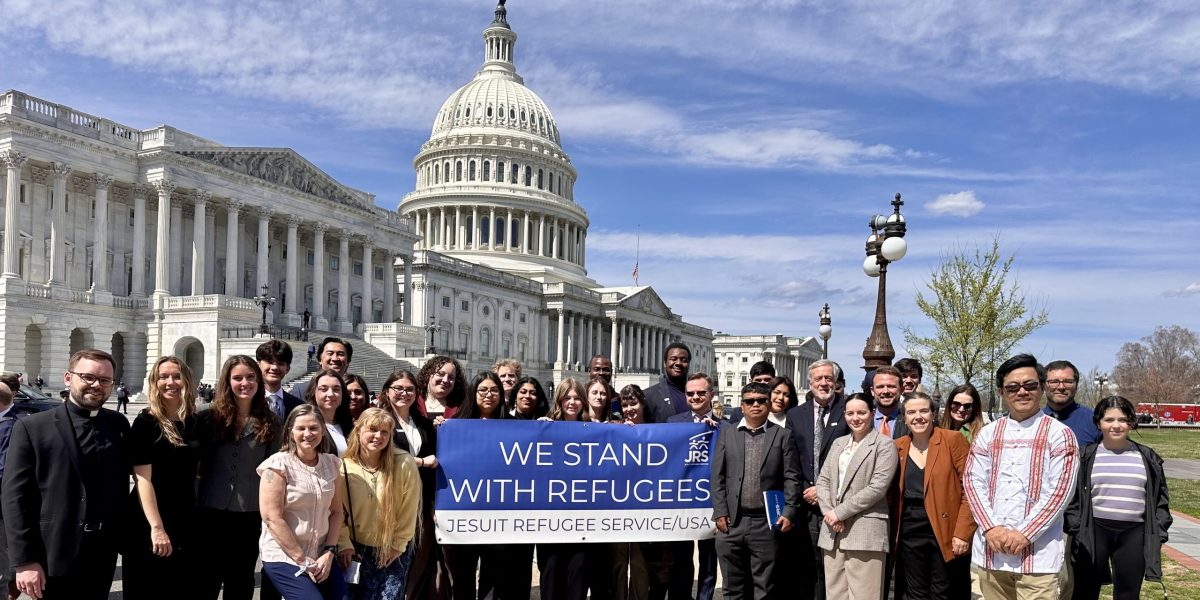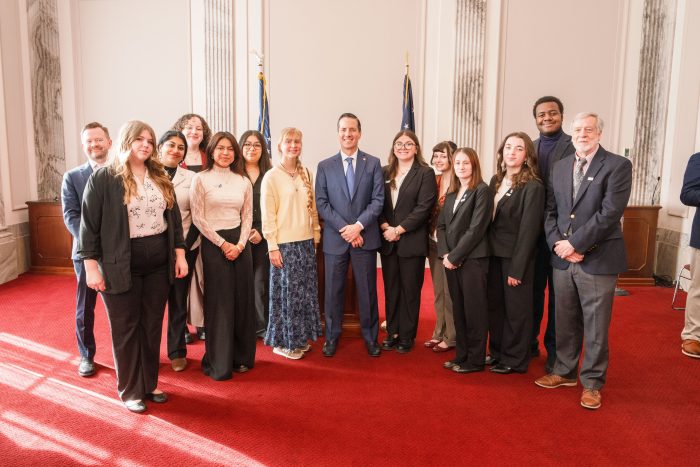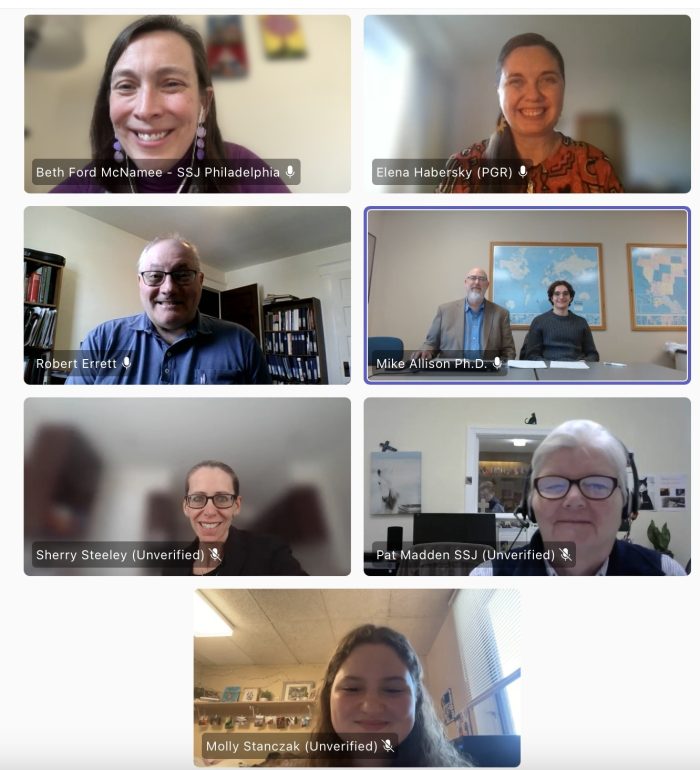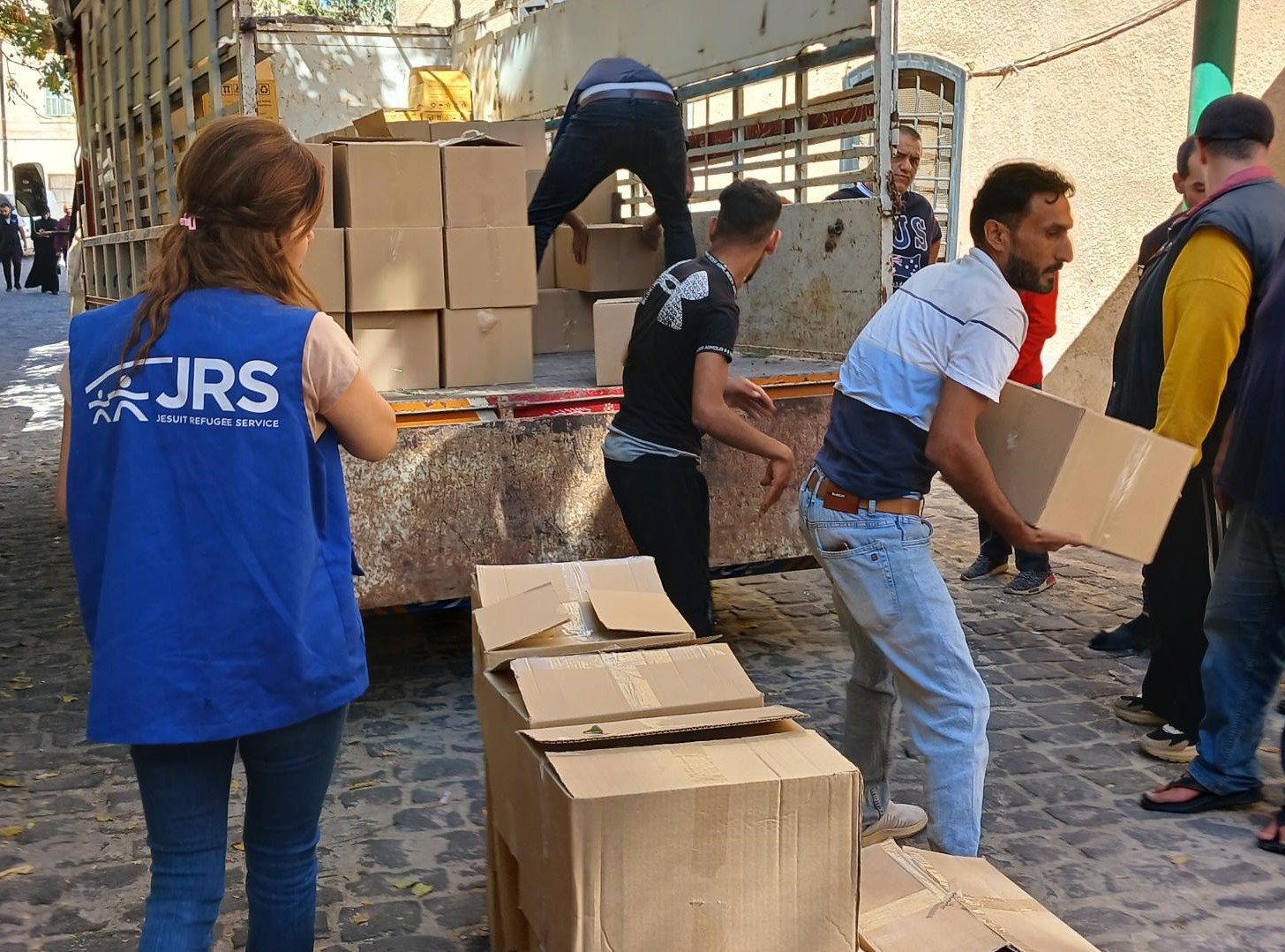On the Feast of the Annunciation, JRS/USA Advocates for Humanitarian Aid
01 April 2025|Chloe Gunther

On March 25, 2025, more than 300 individuals nationwide joined JRS/USA for its 10th annual Advocacy Day. At a critical moment in U.S. foreign policy and humanitarian aid efforts, participants met with 97 different congressional offices, both virtually and in person, to urge robust support for refugee assistance and humanitarian funding in fiscal year 2026.
With representatives across the aisle, advocates explained how humanitarian support, especially for those fleeing war and conflict, is not only a moral obligation but also a necessary action to support the best interests of the United States.
“Those meetings were a reminder that at its core, talking about politics and policies doesn’t have to be divisive and can instead be about connection and finding common ground,” said John Carroll University student Nicole DeCocker.
That morning, the John Carroll students, who had traveled from Ohio to Washington, D.C., to attend in person, met both of their senators – Bernie Moreno and Jon Husted – during a constituent coffee event before visiting several additional Democratic and Republican congressional offices. 
Nicole says she encourages anyone who wants to get involved with advocacy work to start small and to start now. “Advocacy isn’t about waiting for the right moment or having all the answers. It’s about starting conversations, asking questions, and recognizing that real change often begins with a single phone or Zoom call.”
Another participating group joined virtually from Belen Jesuit High School in Miami. Led by senior Matthew Lombardi, the delegation included several classmates, their teacher Teresita Gonzalez, and other local advocates. Together, they met with the offices of Sen. Ashley Moody and Rep. Mario Diaz-Balart.
Matthew has served as his school’s group leader for the past three years. His commitment to advocacy began after a school trip to the Kino Border Initiative in Arizona, where he met with recently arrived migrants, U.S. Border Patrol officers, and ranchers living along the southern border. Listening to these varying experiences and opinions helped shape Matthew’s perspective and eagerness to be part of finding more solutions for people on the move. Upon his return home to Miami, he committed to service and advocacy work.
Reflecting on this year’s meetings, Matthew realized their congressional representatives and staff members are not always fully aware of the details or consequences of foreign aid, especially given the flurry of executive orders and news reports since January 20.
“Representatives’ offices are dealing with new information every day,” he said. “They might not always be up to date…This is exactly why speaking with them directly, showing them that we are informed, and helping them understand the full scope of the situation is so important.”
 Teresita spoke to the patience advocacy work requires. “It is not linear,” she remarked, “we don’t have the luxury of weariness. This means we might not always see the fruit of our work but hope is found in the process and the people you meet along the way.”
Teresita spoke to the patience advocacy work requires. “It is not linear,” she remarked, “we don’t have the luxury of weariness. This means we might not always see the fruit of our work but hope is found in the process and the people you meet along the way.”
For those who traveled to D.C. to meet with their representatives, JRS/USA hosted a short breakfast and briefing in the morning. Just before everyone left for Capitol Hill, Matt Ippel, S.J., led the group in prayer, offering how that day, the Feast of the Annunciation, might inspire participants during their meetings.
This JRS/USA Advocacy Day was the first for Joe Laughlin, S.J. Joe joined the Louisiana delegation, which met with the offices of Sen. John Kennedy, Sen. Bill Cassidy, and Speaker Mike Johnson.
During his undergraduate years, Joe spent a summer in El Paso, where he witnessed the struggles and strength of migrant communities. That experience helped shape his vocation and his desire to accompany those on the margins
“Gabriel came to Mary and revealed what was within her and what she would become,” Joe said, reflecting on the serendipitous timing of the Feast of the Annunciation and Advocacy Day. “That image stayed with me as we met with members of Congress and announced the good work of JRS.”
Joe emphasized that sharing the stories of those forced to flee their homes is advocates’ best tool to reach policymakers. “It is so important for us to get those stories out there, both to our representatives and the general public.”
Fr. Mike, a Redemptorist missionary priest, also joined this year’s Advocacy Day. With more than three decades of experience in migrant ministry, he now includes advocacy as a core part of his mission.
 “Migration ministry does not begin at the border,” Fr. Mike said. “It begins in Scripture, and it begins when we recognize that migrants are part of our local communities.”
“Migration ministry does not begin at the border,” Fr. Mike said. “It begins in Scripture, and it begins when we recognize that migrants are part of our local communities.”
In his meetings, Fr. Mike focused on the connection between migrant farmworkers, rural America, and the U.S. economy. He spoke about how many rural communities depend on the work of migrant farmworkers and how local businesses struggle when those workers are forced out.
The breadth of advocates’ backgrounds and experiences brought important perspectives to our Hill conversations. These conversations are imperative to ensuring that congressional offices know what their constituents care about.
“I am incredibly proud of the work JRS/USA and our advocates have [done] this Advocacy Day. Our efforts will work toward creating more ripples for change,” said Outreach Officer Clara Sayans, who helped manage the event.
As we look to the next four years, JRS anticipates that the need to continue these conversations will only grow. “This is just the beginning,” Clara said.
Through Action Alerts, we will keep you up to date on pertinent legislation, threats to JRS’s humanitarian work, and how you can advocate for the needs of forcibly displaced people. Drawing inspiration from the advocates who offered their testimonies above, we hope you will continue to support us as we work to preserve our country’s identity as a nation that uses its many blessings to do good in the world.


